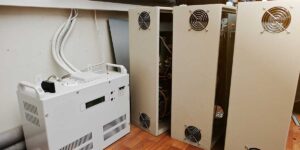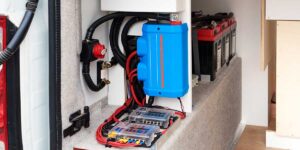There’s not much that’s more important to Bay Area commercial facilities than reliable electricity. When the local grid fails, a reliable uninterruptible power supply (UPS) system can keep servers, production lines, and safety equipment running.
However, if that backup UPS system falters, your facility’s safety, productivity, and reputation are at immediate risk. Nite and Day Power explores some common UPS problems and how industry experts handle these situations quickly and safely.
Battery Issues: The Leading Cause of UPS Downtime
 Many service calls trace back to a battery malfunction. The first clues include reduced runtime, repeated alarms, or a UPS system that switches to bypass too early. Heat is often the culprit.
Many service calls trace back to a battery malfunction. The first clues include reduced runtime, repeated alarms, or a UPS system that switches to bypass too early. Heat is often the culprit.
Professionals start by testing each battery string with ohmic and impedance analysis. This identifies weak cells before they fail completely. During maintenance, they perform full discharge capacity testing, tighten intercell connections, and verify correct charging voltage.
Proper temperature control extends the life of both VRLA and lithium-ion designs. Under good conditions, VRLA batteries last three to six years, while lithium-ion options can run close to ten.
When Loads Grow Too Fast: Overcoming Overload Conditions
Expanding operations or adding new technology sometimes creates overload that pushes UPS capacity to its limit. Alarms sound, the system transfers to bypass, or it may automatically shut down.
Field engineers perform a load audit to find the source. A complete run of tests looks at power draw, harmonic distortion, and phase imbalances. If the UPS appears undersized, technicians should recommend either adding modules in parallel or upgrading to a higher-rated unit.
Adjusting breaker coordination and verifying firmware limits keep protection circuits from tripping unnecessarily.
Inverter Faults: Repairing the Heart of the System
 Sudden UPS problems, including complete failure, can arise when an inverter fails. The component converts stored battery power into AC power that flows into your electrical system.
Sudden UPS problems, including complete failure, can arise when an inverter fails. The component converts stored battery power into AC power that flows into your electrical system.
Technicians isolate inverter problems by testing gate driver boards, IGBTs, capacitors, and control cards. They also look for overheating that comes with inverter faults by checking DC link voltage and performing thermal scans.
Replacement of inverter modules or electrolytic capacitors often restores stability. Routine cleaning and airflow verification prevent the heat buildup that is the mortal enemy of virtually every component.
Power Supply Failure: Why Rectifiers and Chargers Need Attention
UPS problems, including power failure, can occur when the rectifier or charger cannot maintain the correct battery voltage. The UPS might signal “charger fault” or fail to hold a steady float charge.
Service personnel check semiconductors and test DC ripple in response to common error codes and replace faulty SCRs or diodes as needed. When the UPS system is back up, a technician should check voltage calibration and the quality of the AC input to your facility’s electrical system.
Voltage Fluctuation: Stabilizing Power for Sensitive Loads
Frequent transfers to battery or unexpected reboots indicate voltage fluctuation at the input or output. Loose wiring, poor grounding, or a weak voltage regulator can all cause the issue.
Professional service teams use power analyzers to record fluctuations and harmonics. They tighten all terminations, clean bus bars, and confirm that synchronization between the UPS and generator remains within specification. Installing external stabilizers or filters can further smooth the waveform and protect sensitive electronics.
Environmental and Mechanical Failures: The Silent Threat
Old-fashioned dust can quickly lead to overheating, so watch for alarms, rapidly clogging filters, or unusually noisy fans. Tiny debris accumulates to restrict airflow, which causes overheating and premature wear and tear on sensitive parts.
Techs handle cleaning as needed and change filters and vacuum dust as part of a regular maintenance schedule.
Trust Nite and Day Power To Keep Your UPS Performing
Nite and Day Power’s factory-trained specialists understand every nuance of UPS problems and how to deal with them. We also provide unmatched efficiency in UPS maintenance that meets or exceeds all manufacturer recommendations. Schedule regular maintenance with our team to avoid these problems and ensure your system will be ready when you need it most.
Call (800) 540-7693 or contact us online to schedule your maintenance or consultation today. Safeguard your uptime and let the experts who know UPS reliability inside and out keep your power system ready and reliable.

